Special Report
25 Most Polluted Cities in the World
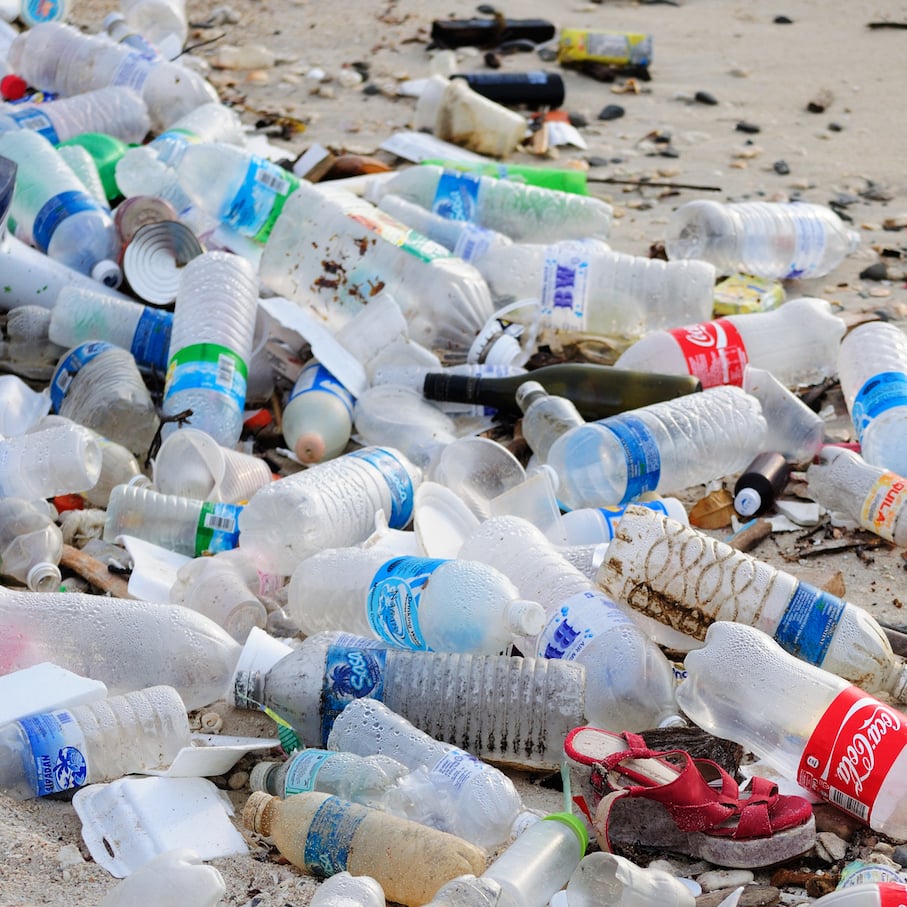
Published:
Last Updated:

The rapid industrialization across parts of Asia in recent years has been an economic boon. Unfortunately, industrialization and economic development are often at odds with environmental and public health concerns. In some parts of the world, a booming manufacturing sector and rapidly growing middle class have led to dangerous and potentially deadly levels of air pollution — often more than 10 times the safe standard set by the World Health Organization.
One specific type air pollution, commonly known as PM2.5 — shorthand for particulate matter 2.5 micrometers in diameter or smaller — is especially harmful. For perspective, the diameter of a human hair is 50-70 micrometers, so particles that are 2.5 micrometers or smaller are very fine and inhalable.
PM2.5 is typically generated by combustion — either from fires, automobiles, or factories — and this type of air pollution has been linked to a number of health issues, including asthma, lung infections, heart attacks, and premature death.
Heavy industrialization and a rising standard of living are the most common causes of high concentrations of air pollution in the cities on this list — though they are not the only culprits. In some of the most polluted cities, high concentrations of fine particulates in the air are the result of lacking or non-existent public works infrastructure, such as sewage systems.
24/7 Wall St. reviewed the average annual concentration of PM2.5 per cubic meter in nearly 3,000 cities around the globe to identify the world’s most polluted cities. The vast majority of cities with the highest concentrations of PM2.5 are in Asia, and a handful are in Africa. In each of the cities on this list, air pollution is at least 4.8 times worse than it is in the Visalia-Porterville, California, metro area, the most polluted metro area in the United States.
Click here to see the world’s most polluted cities.
Click here to see our detailed findings and methodology.
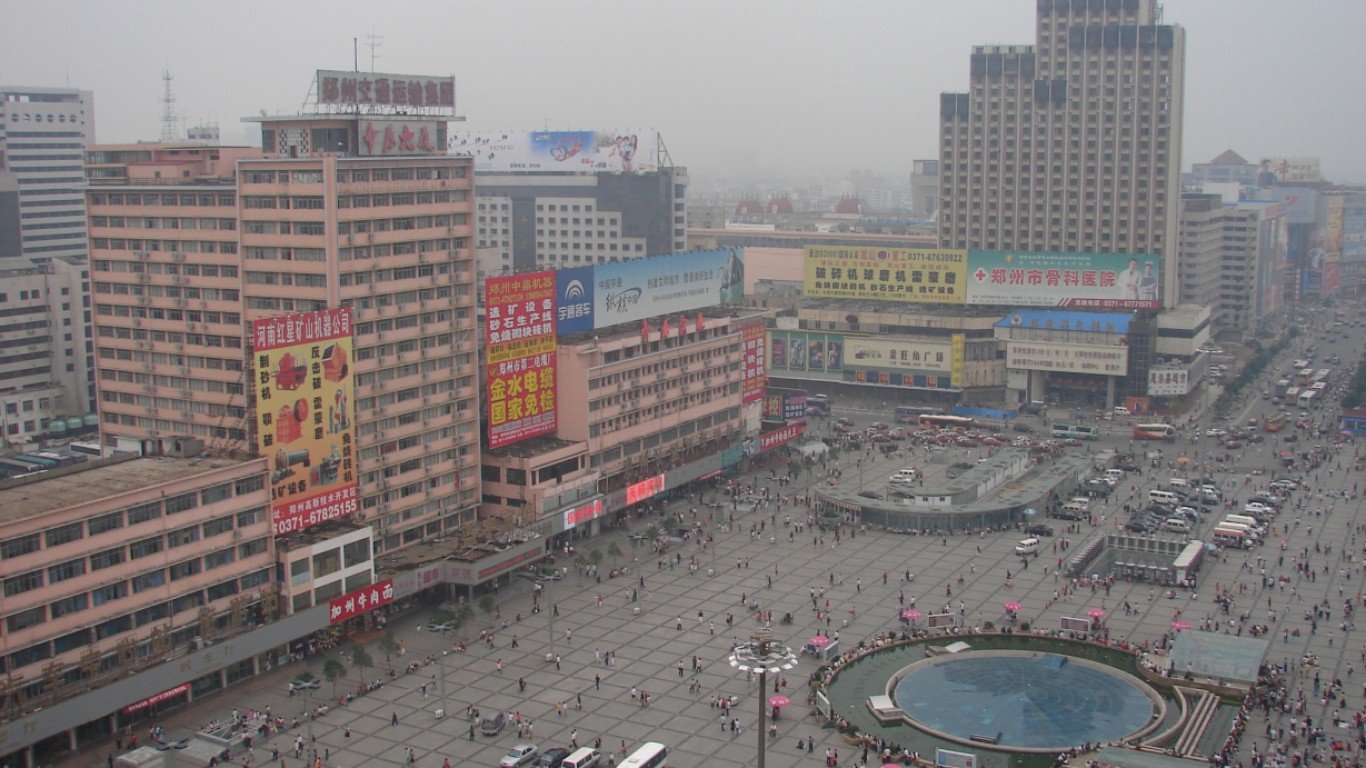
25. Zhengzhou, China
> Population: 4.5 million
> Average PM2.5 pollution per cubic meter: 86 micrograms
> Average PM10 pollution per cubic meter: 171 micrograms
Zhengzhou is one of the largest manufacturing centers in China. The Henan Province capital is famously home to a massive quarter-million worker Foxconn manufacturing center, among other manufacturers. More than one in every 10 smartphones in the world are built in Zhengzhou. Not surprisingly, the industrial hub is also one of the most polluted cities on earth.
[in-text-ad]
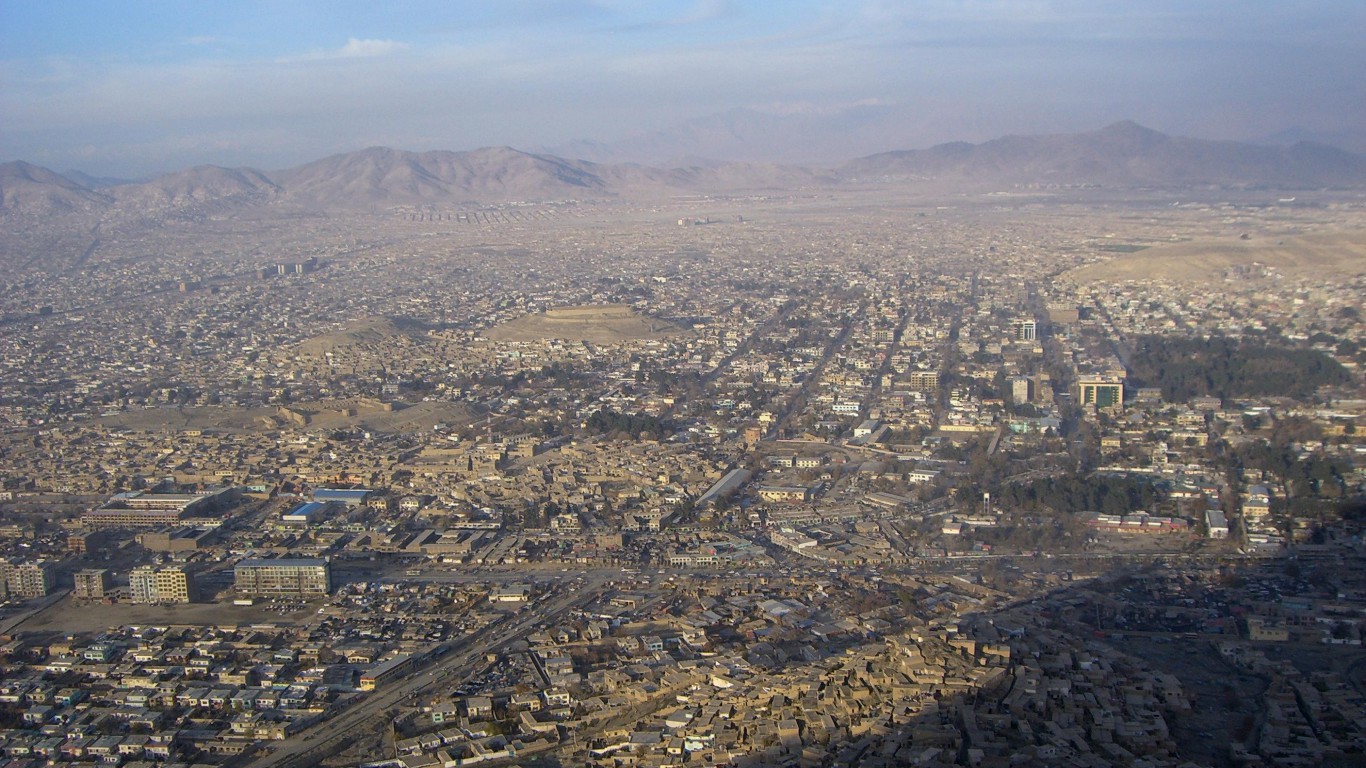
24. Kabul, Afghanistan
> Population: 4.8 million
> Average PM2.5 pollution per cubic meter: 86 micrograms
> Average PM10 pollution per cubic meter: 260 micrograms
The majority of the world’s most polluted cities are in Asia, and Kabul, Afghanistan, is among them. The air is severely polluted with an average concentration of 86 micrograms of PM2.5 per cubic meter of air, well above the World Health Organization standard of 10 micrograms.
Kabul’s pollution is partially linked to inadequate infrastructure. According to some estimates, only about one in every 50 homes in the capital city are connected to a sewage system, leaving most household waste to flow and often dry in the streets — much of it ultimately turning into harmful dust. Adding to the problem, many in the country burn animal dung to heat their homes.
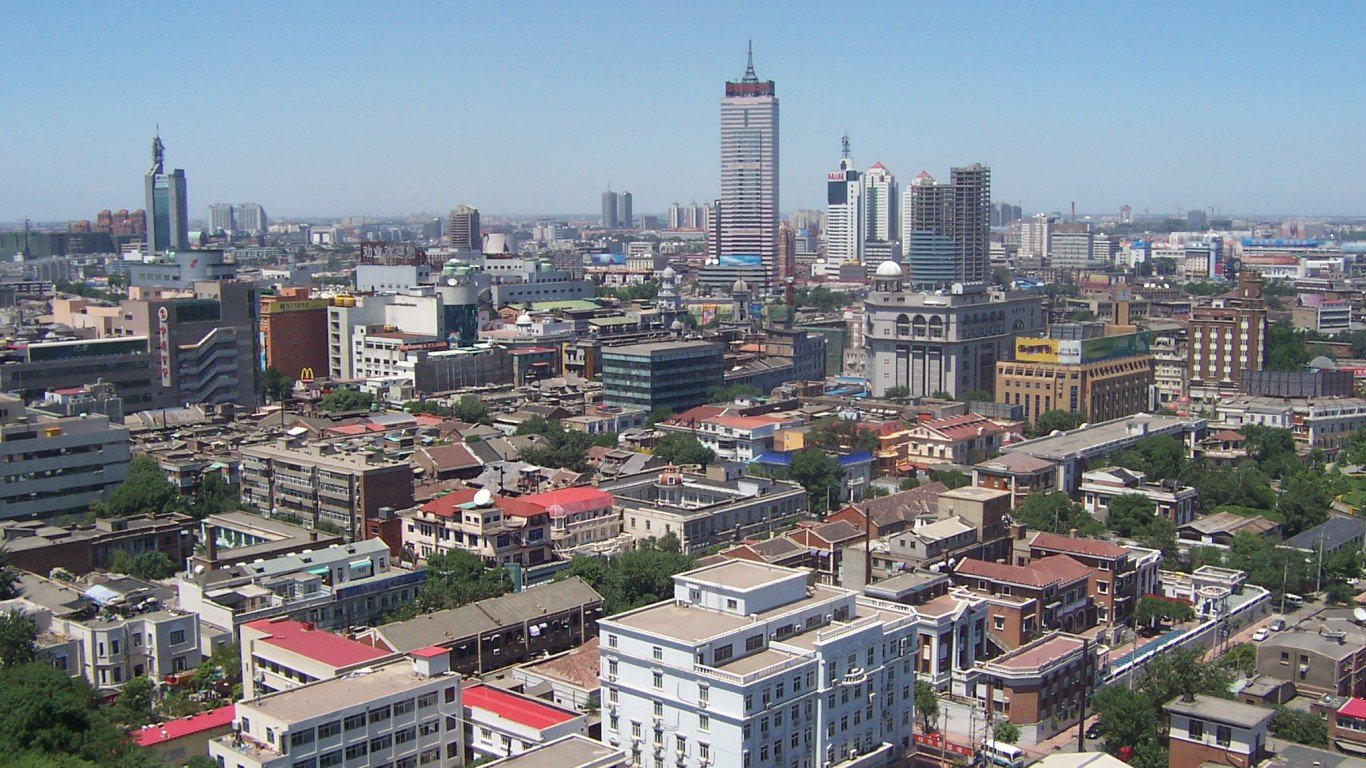
23. Tianjin, China
> Population: 11.6 million
> Average PM2.5 pollution per cubic meter: 87 micrograms
> Average PM10 pollution per cubic meter: 150 micrograms
Located along the coast of the Yellow Sea, TianJin is one of 10 cities in China to rank among the most polluted in the world. The average level of concentration of harmful PM2.5 in the city is 87 micrograms per cubic meter of air, nearly five times the concentration nearly five times the concentration even in the most polluted American cities.
Polluted cities are often heavily populated, and TianJin is no exception. Home to an estimated 11.6 million, it is nearly twice as large as the most populated American city, yet far from the most populated in China.
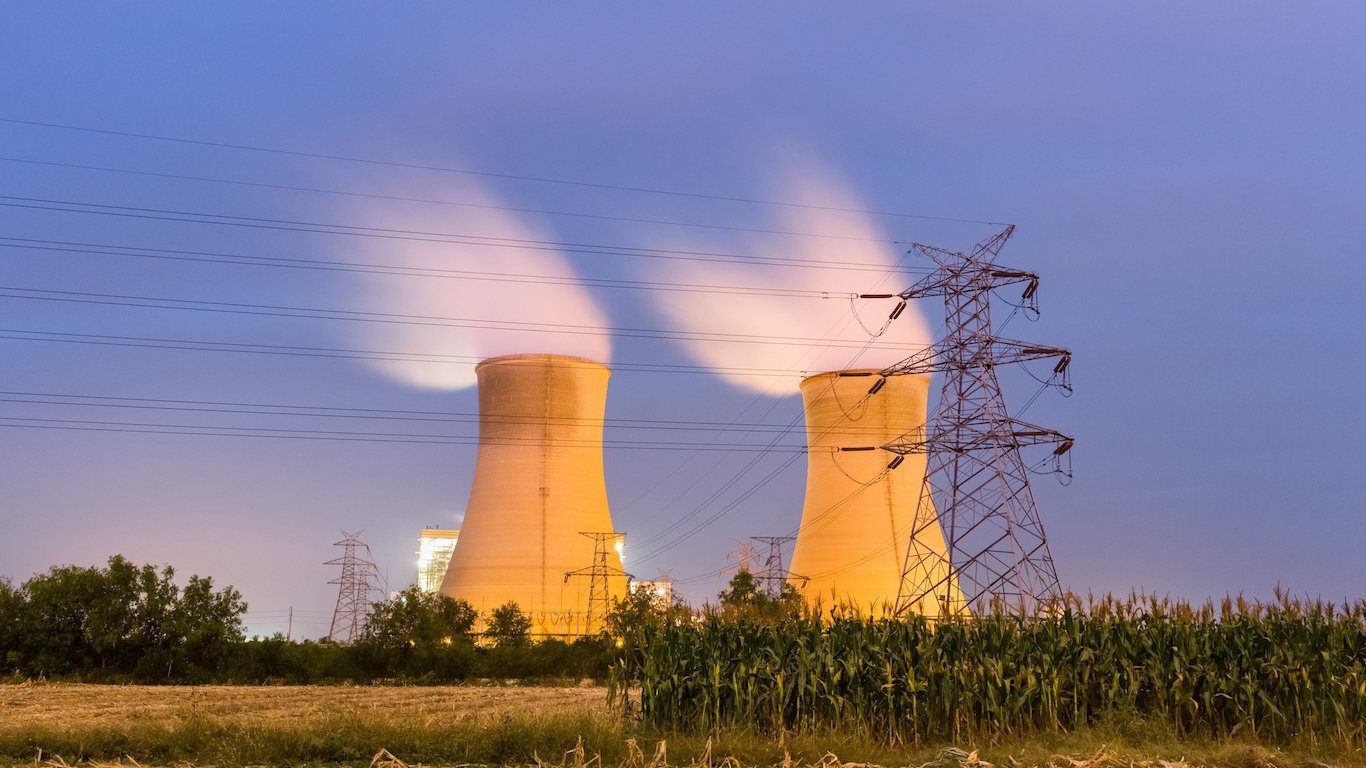
22. Cangzhou, China
> Population: 537,000
> Average PM2.5 pollution per cubic meter: 88 micrograms
> Average PM10 pollution per cubic meter: 133 micrograms
Like other polluted Chinese cities in the Hebei province, Cangzhou is an industrial center, home to manufacturers of chemicals, electrical appliances, textiles, and hardware machinery. Cangzhou’s air is severely polluted with an average concentration of 88 micrograms of PM2.5 per cubic meter of air, well above the World Health Organization standard of 10 micrograms. Fumes from factories likely account for much of the city’s air pollution problems.
[in-text-ad-2]
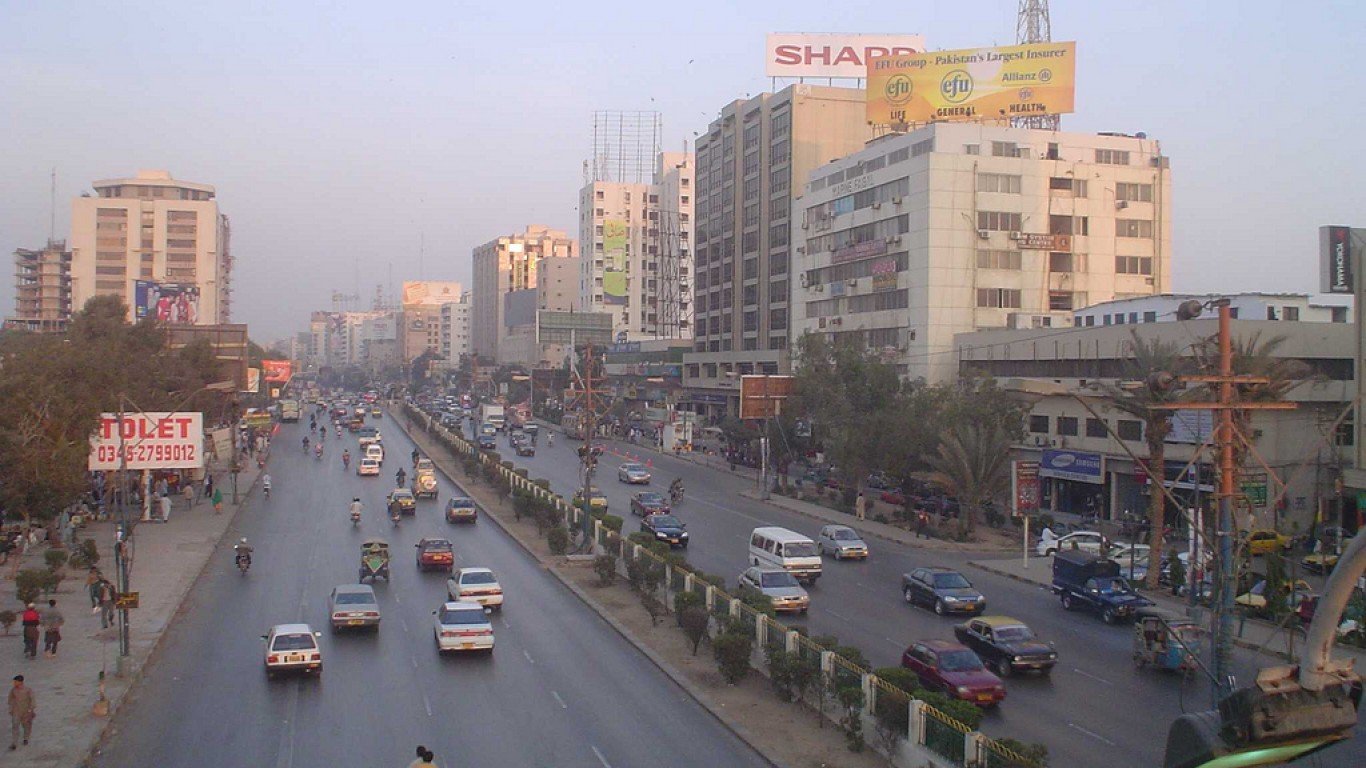
21. Karachi, Pakistan
> Population: 17.1 million
> Average PM2.5 pollution per cubic meter: 88 micrograms
> Average PM10 pollution per cubic meter: 290 micrograms
Home to an estimated 17.1 million, Karachi is the most populated city in Pakistan. It is also one of the most polluted. The average annual concentration of PM2.5 in the city is 88 micrograms per cubic meter of air. Largely the product of industrial emissions, personal vehicle emissions, and burning garbage, the high pollution in Karachi has been linked to increasing incidences in the city of certain respiratory and cardiac diseases.
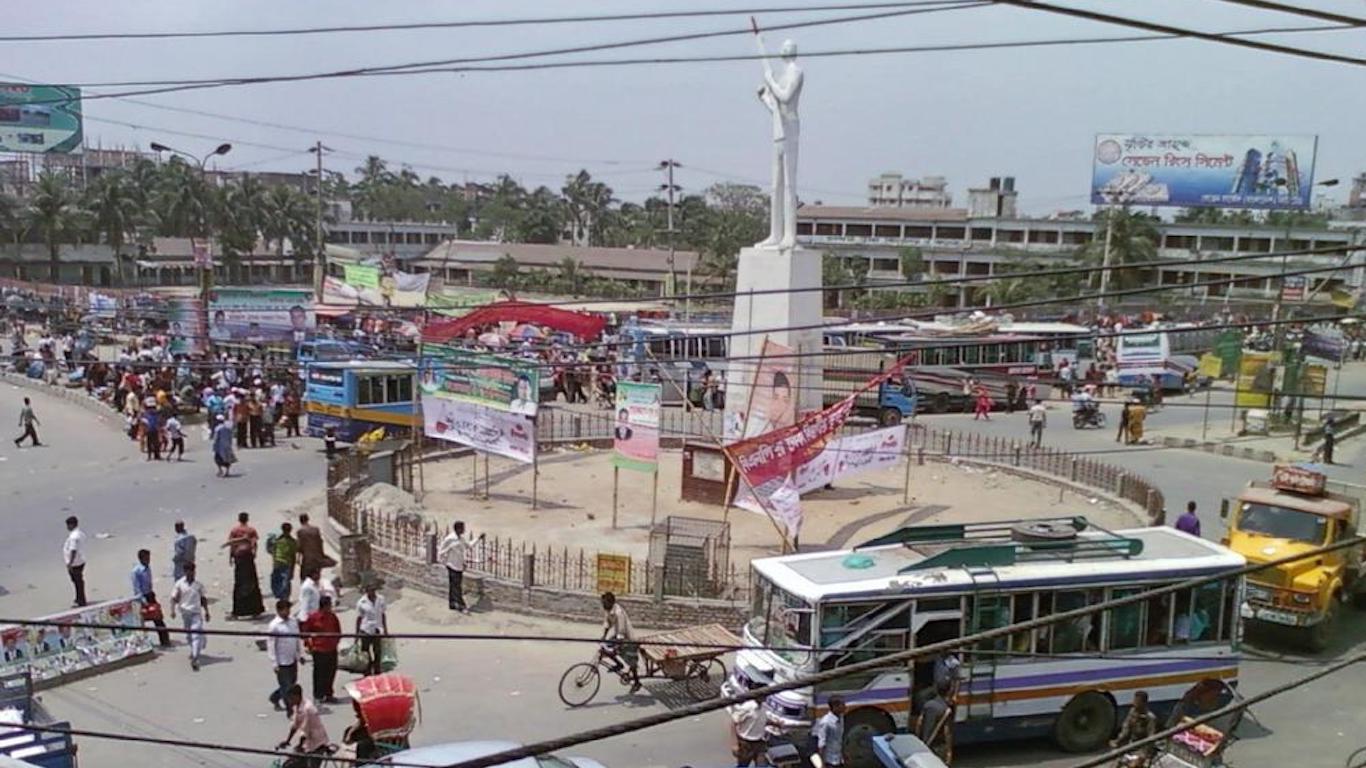
20. Gazipur, Bangladesh
> Population: 1.2 million
> Average PM2.5 pollution per cubic meter: 89 micrograms
> Average PM10 pollution per cubic meter: 155 micrograms
Gazipur is one of four cities in Bangladesh to rank among the most polluted in the world. The average level of PM2.5 in the city is 89 micrograms per cubic meter of air, many times the 10 microgram per cubic meter standard set by the World Health Organization.
Bangladesh is a global manufacturing center, and factories are largely to blame for pollution in Gazipur. City residents report blurred vision, nausea, and other symptoms stemming from fumes generated by a Chinese battery manufacturing facility. Illegal coal burning kilns in factories across the country also contributes considerably to air pollution.
[in-text-ad]
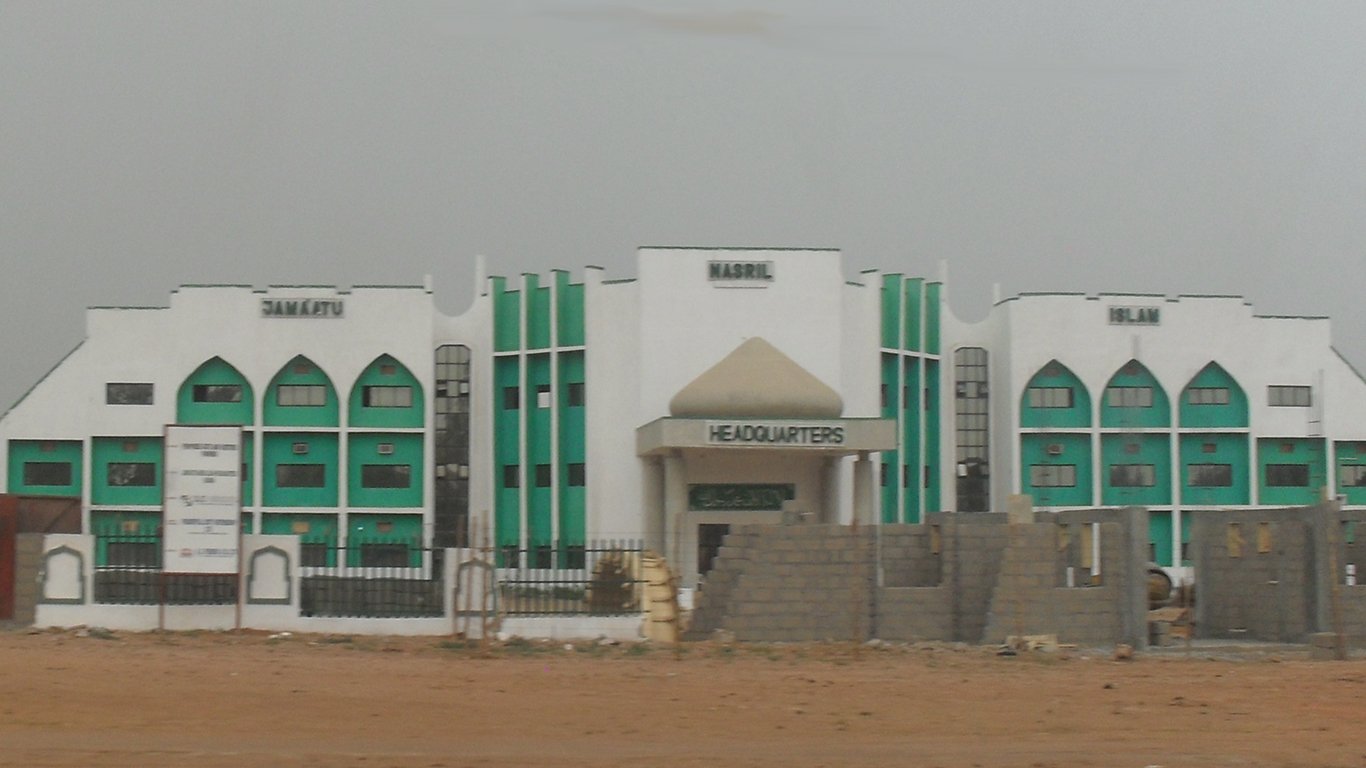
19. Kaduna, Nigeria
> Population: 1.1 million
> Average PM2.5 pollution per cubic meter: 90 micrograms
> Average PM10 pollution per cubic meter: 423 micrograms
Kaduna, Nigeria is one of three African cities to rank among the most polluted in the world. A lack of infrastructure and development is largely to blame for the dangerously high concentrations of particulate in the city’s air. Without a reliable electricity source, many in Kaduna rely on generators, which spew out harmful fumes. Similarly, without proper waste management infrastructure, many in the city simply burn their refuse. Exhaust from old vehicles further exacerbates the city’s air pollution problems.
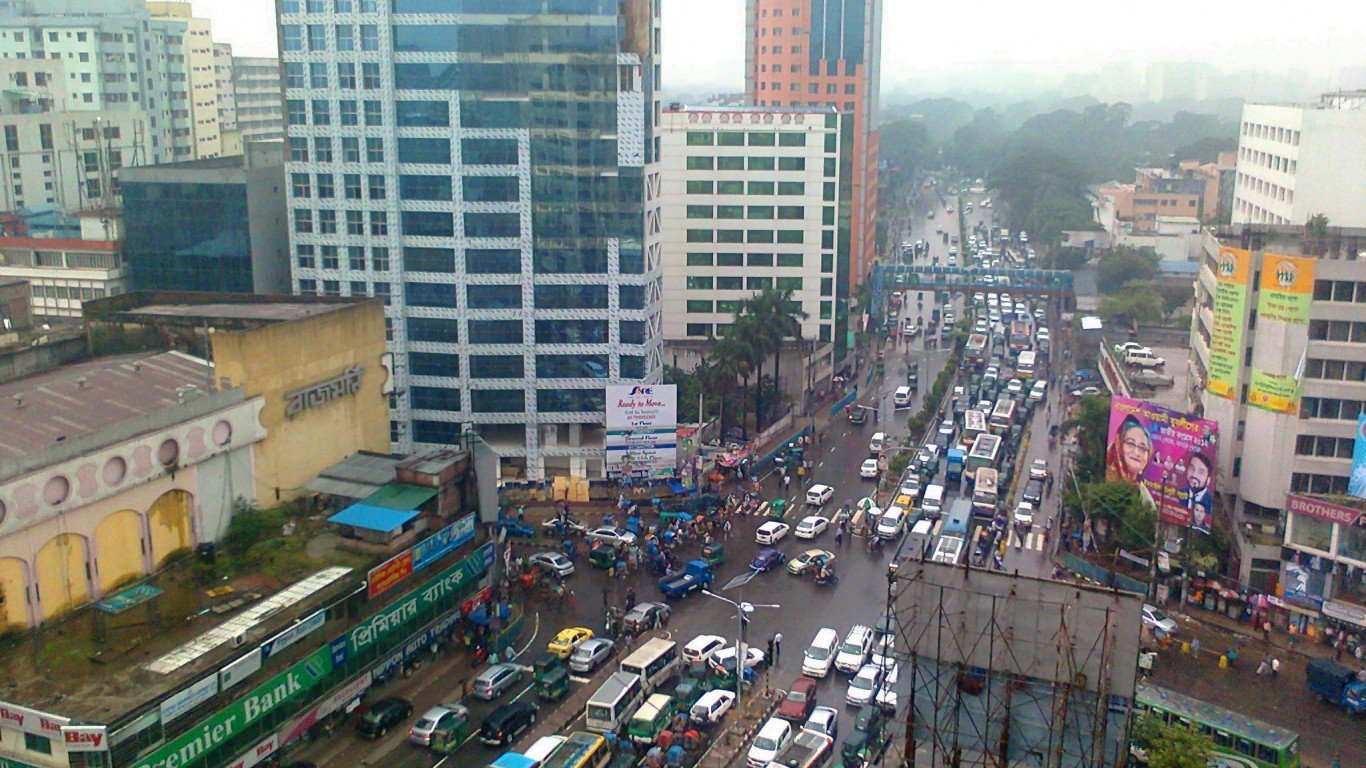
18. Dhaka, Bangladesh
> Population: 18.2 million
> Average PM2.5 pollution per cubic meter: 90 micrograms
> Average PM10 pollution per cubic meter: 158 micrograms
Other than China, no country has more cities on this list than Bangladesh — and the South Asian country’s capital, Dhaka, is one of these highly-polluted cities. The city of over 18 million has a robust clothing industry that has contributed to not just some of the worst air pollution in the world, but to severe water pollution as well. The biggest source of pollution in the city is the brick kilns, which accounts for 38% of the area’s fine particle pollution, according to the World Bank.
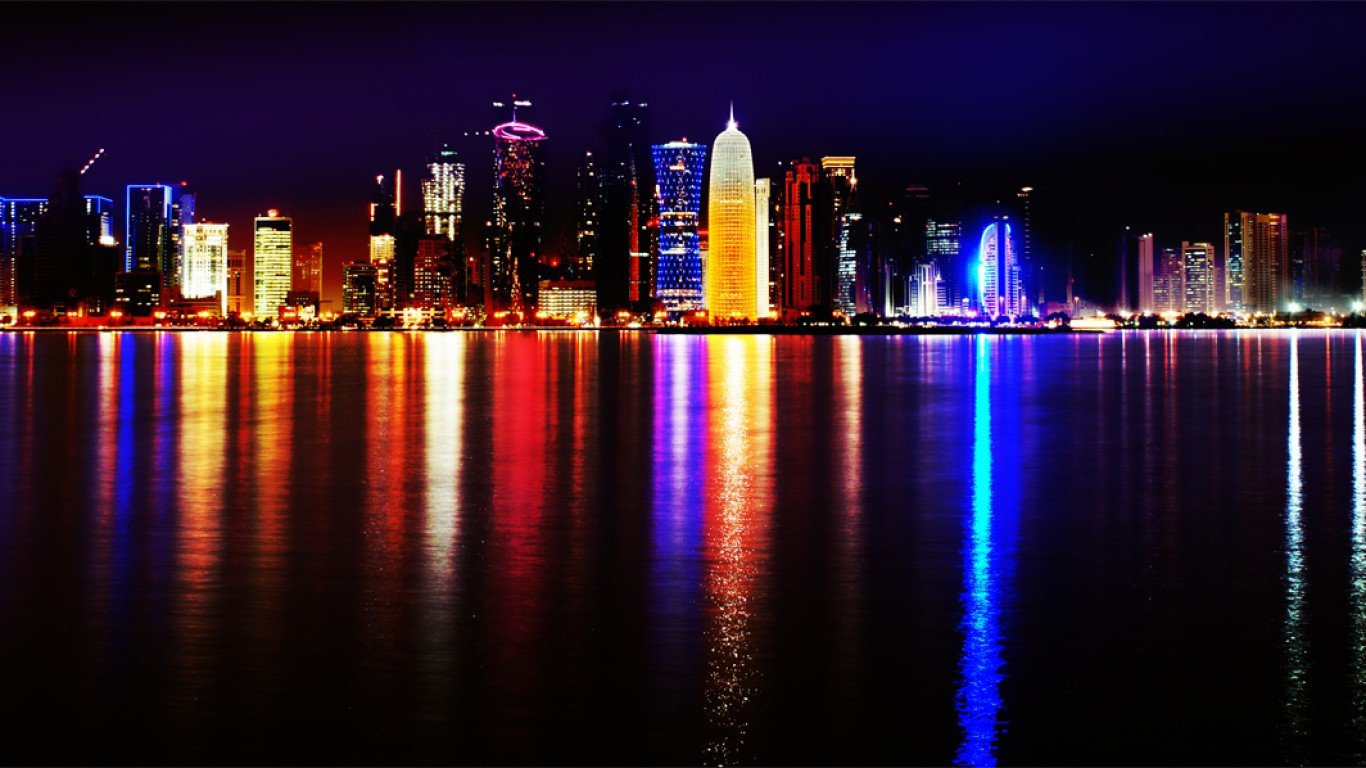
17. Doha, Qatar
> Population: 956,500
> Average PM2.5 pollution per cubic meter: 93 micrograms
> Average PM10 pollution per cubic meter: 168 micrograms
Doha, Qatar is the only city in the Middle East to rank among the worst in the world for PM2.5 air pollution. However, Doha’s air pollution may not be as great a cause for concern as it is in other cities on this list, as much of it may be little more than desert dust. The health effects of desert dust are not well known. However, the city has grown rapidly in recent years and increased construction operations and vehicle traffic may also explain Doha’s high air pollution levels.
[in-text-ad-2]
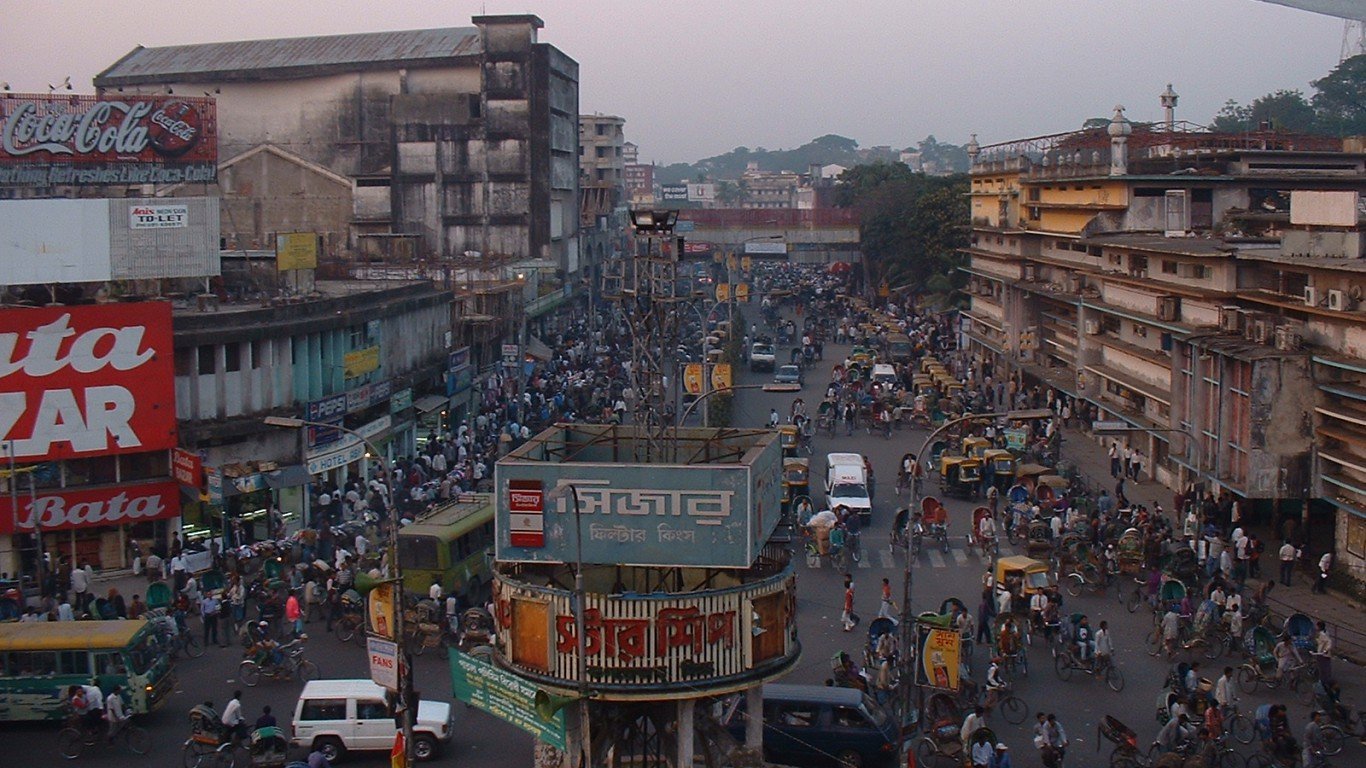
16. Chittagong, Bangladesh
> Population: 4.6 million
> Average PM2.5 pollution per cubic meter: 95 micrograms
> Average PM10 pollution per cubic meter: 135 micrograms
Chittagong is one of the most polluted cities in one of the most polluted countries in the world. The average level of concentration of PM2.5 in the city is 95 micrograms per cubic meter of air. The dangerous air pollution in the coastal city is caused in no small part by a practice known as beaching — or the dismantling of old ships along the coastline. Dismantling and melting steel parts of old ships is a major industry in Chittagong. But when old ships that contain now-banned harmful chemicals like PCBs and DDT are dismantled, the contaminants are often dispersed into the air that residents breathe.

15. Langfang, China
> Population: 868,000
> Average PM2.5 pollution per cubic meter: 96 micrograms
> Average PM10 pollution per cubic meter: 144 micrograms
Smog shrouded streets of Beijing are what many likely imagine when thinking of air pollution in China. However, PM2.5 pollution is more concentrated in the city of Langfang, along the outskirts of Beijing. The average annual concentration of PM2.5 in Langfang is 96 micrograms per cubic meter of air, compared to 85 micrograms per cubic meter in Beijing.
Though China has policies on the books to reduce pollution in the region’s steel and coal industries, they are not being enforced.
[in-text-ad]
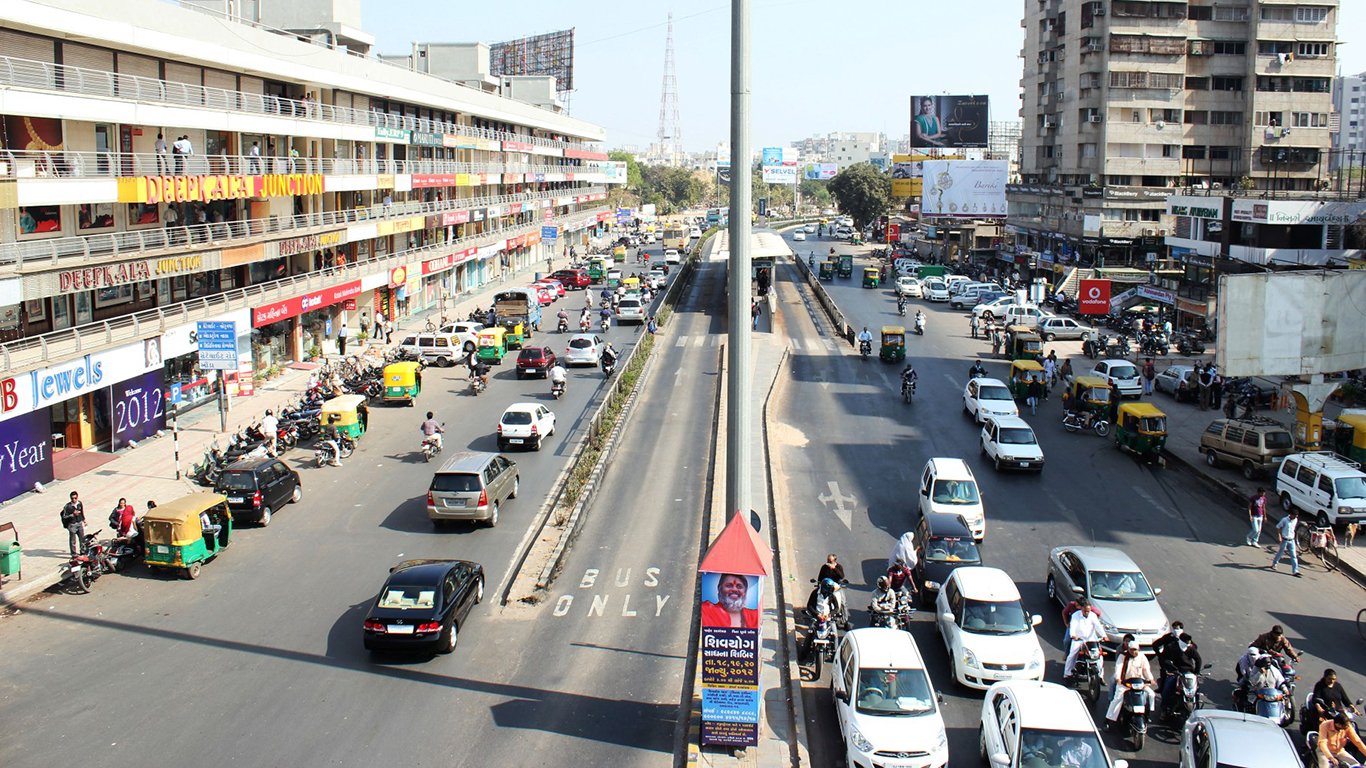
14. Ahmedabad, India
> Population: 7.6 million
> Average PM2.5 pollution per cubic meter: 100 micrograms
> Average PM10 pollution per cubic meter: 83 micrograms
Ahmedabad, India is one of only 14 cities in the world in which PM2.5 air pollution average concentration levels are 100 micrograms per cubic meter or higher. The city is located in Northwestern India in the state of Gujarat. As is the case in many of the world’s most polluted cities, vehicle and industrial emissions are largely to blame for the high concentrations of particulate in the city’s air. A major urban center, Ahmedabad is home to nearly 8 million people.
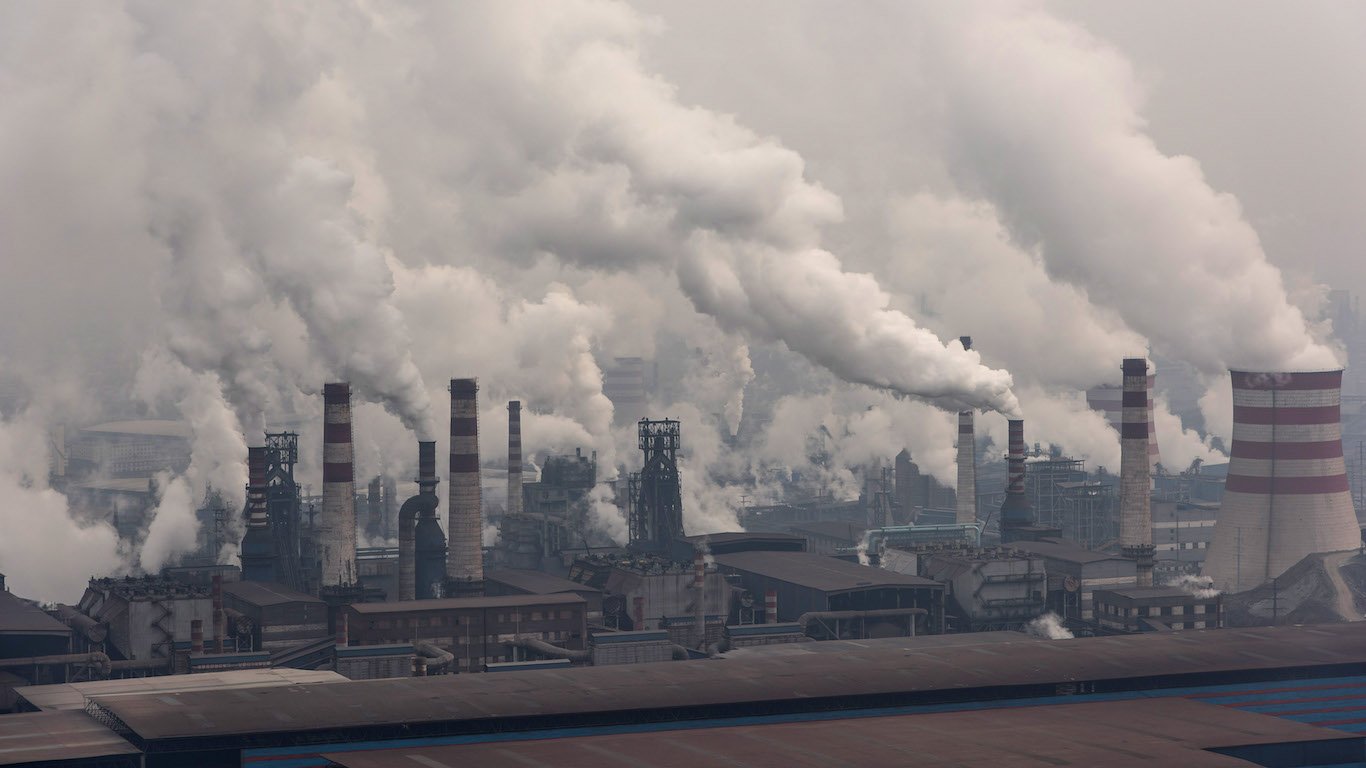
13. Tangshan, China
> Population: 2.9 million
> Average PM2.5 pollution per cubic meter: 102 micrograms
> Average PM10 pollution per cubic meter: 153 micrograms
Tangshan, China is one of the most polluted cities in one of the most polluted countries in the world. Tangshan is the largest steel producer in the country, and steel production is one of the largest contributing factors to air pollution. In late 2017, the city was forced to enact emergency procedures, halting cement production and reducing steel production, in order to address a period of especially heavy air pollution. The average level of concentration of PM2.5 in Tangshan is 102 micrograms per cubic meter of air.
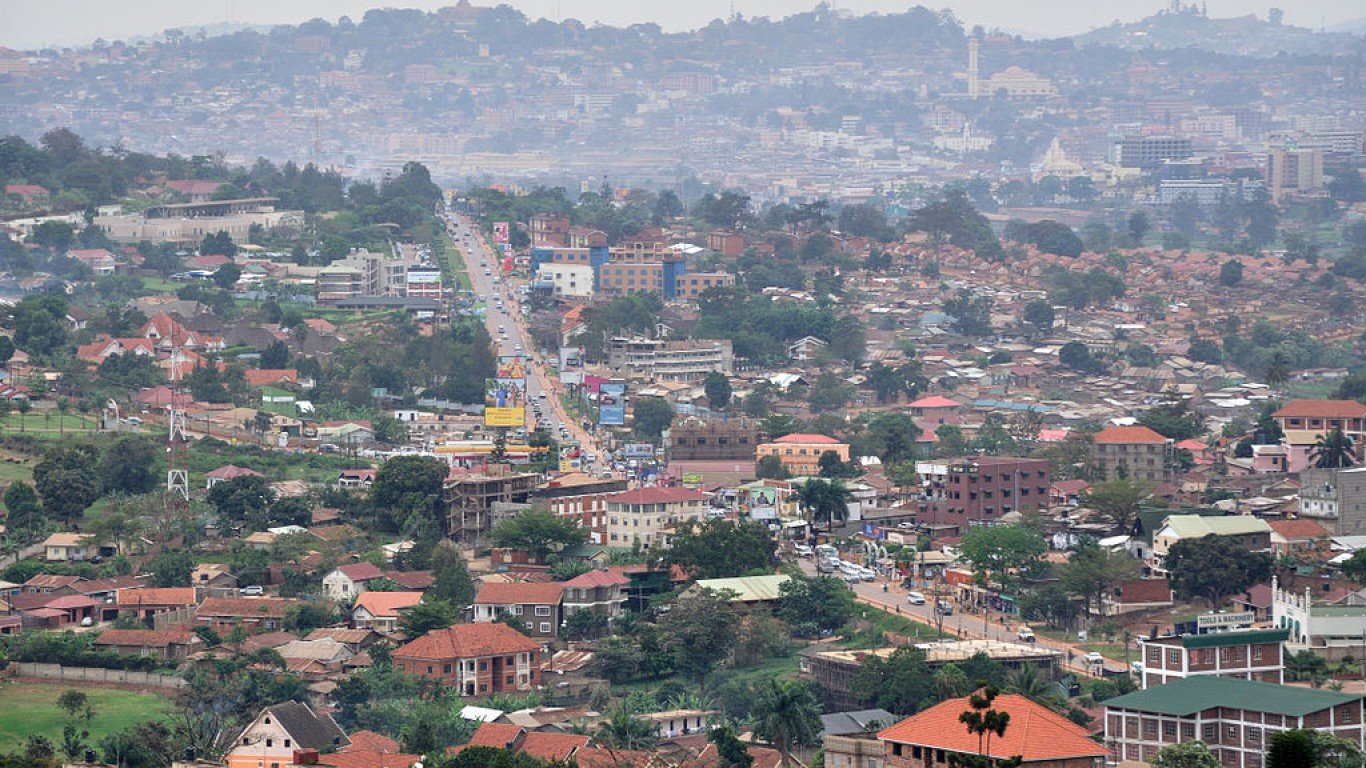
12. Kampala, Uganda
> Population: 2.0 million
> Average PM2.5 pollution per cubic meter: 104 micrograms
> Average PM10 pollution per cubic meter: 170 micrograms
Air pollution in Kampala, Uganda is more highly concentrated than in nearly any other city in Africa. Traffic congestion is a considerable problem in the Ugandan capital, which likely contributes to the high concentrations of PM 2.5 pollution. Additionally, only about 25% of the city’s roads were paved as of 2014, and dust kicked up from unpaved roads are a significant source of larger particulate air pollution, which is also highly concentrated in the city’s air.
[in-text-ad-2]
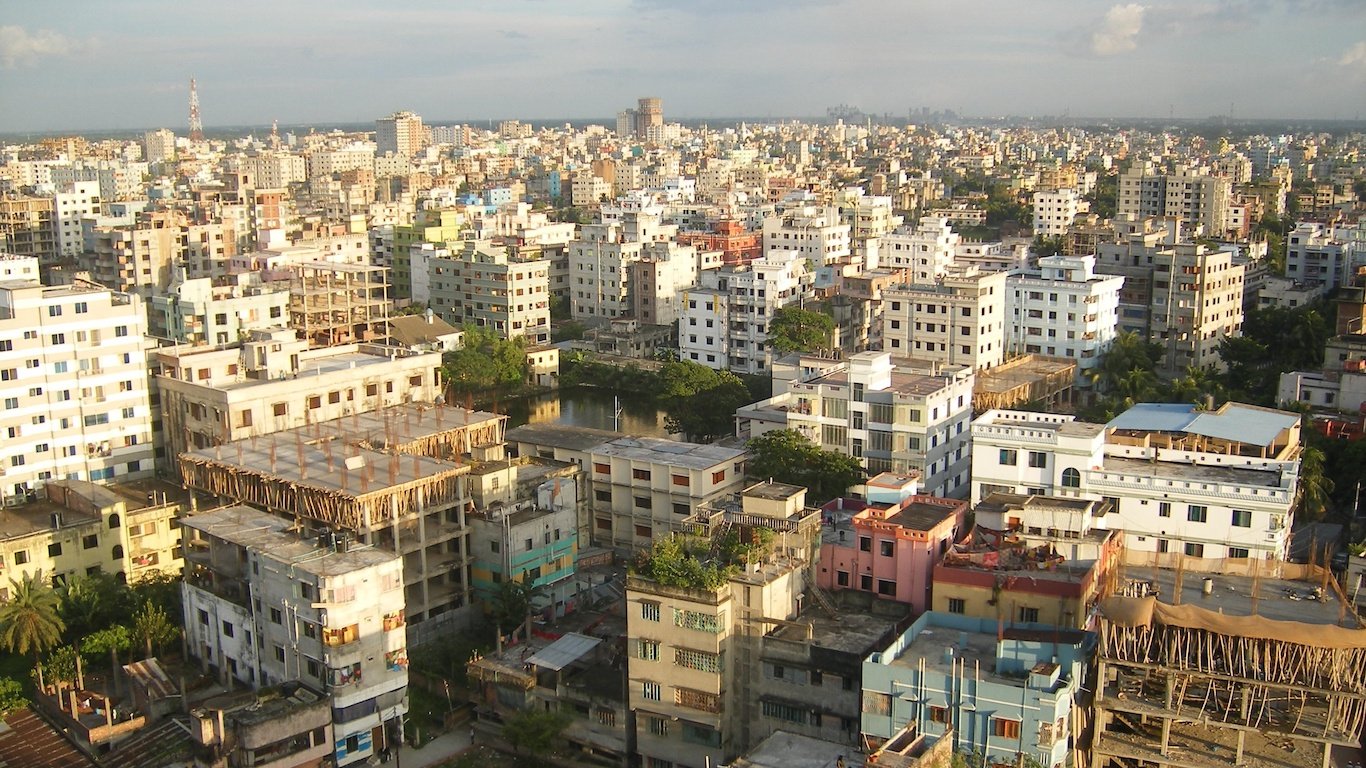
11. Narayanganj, Bangladesh
> Population: 543,000
> Average PM2.5 pollution per cubic meter: 106 micrograms
> Average PM10 pollution per cubic meter: 191 micrograms
The fourth Bangladeshi city on this list, and the most polluted in the country, Narayanganj is just south of Dhaka, the national capital and another of the most polluted cities in the world. The city is known for being home to numerous jute mills, which produce many different kinds of pollution.
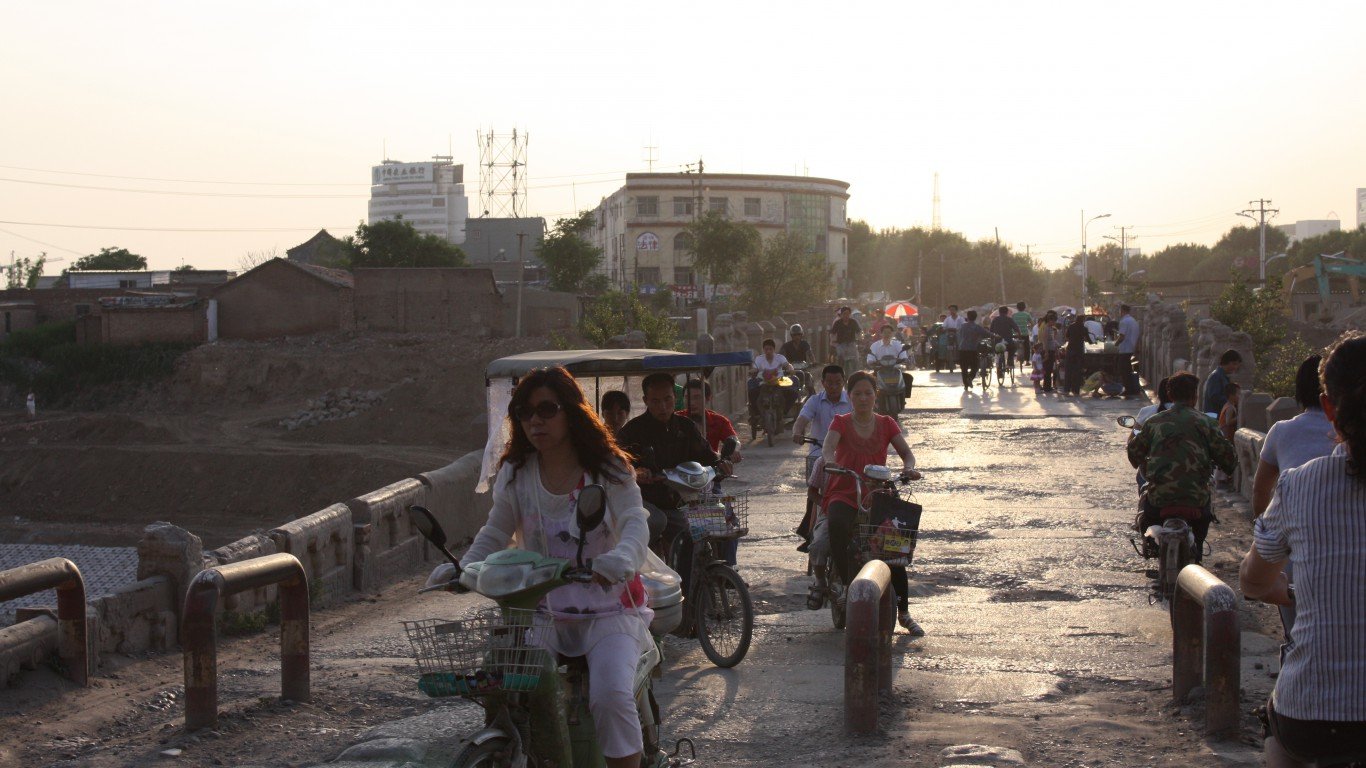
10. Hengshui, China
> Population: 4.4 million
> Average PM2.5 pollution per cubic meter: 107 micrograms
> Average PM10 pollution per cubic meter: 161 micrograms
As measured by annual average concentration of PM2.5, Hengshui is the fifth most polluted city in China and the 10th most polluted in the world. As is the case in much of the country, industrialization is largely to blame for the pollution.
In an effort to reduce air pollution, the city recently vowed to be stricter and more punitive with businesses that do not adhere to emissions policy, particularly in high emission sectors like steel, iron, cement, and glass manufacturing.
[in-text-ad]
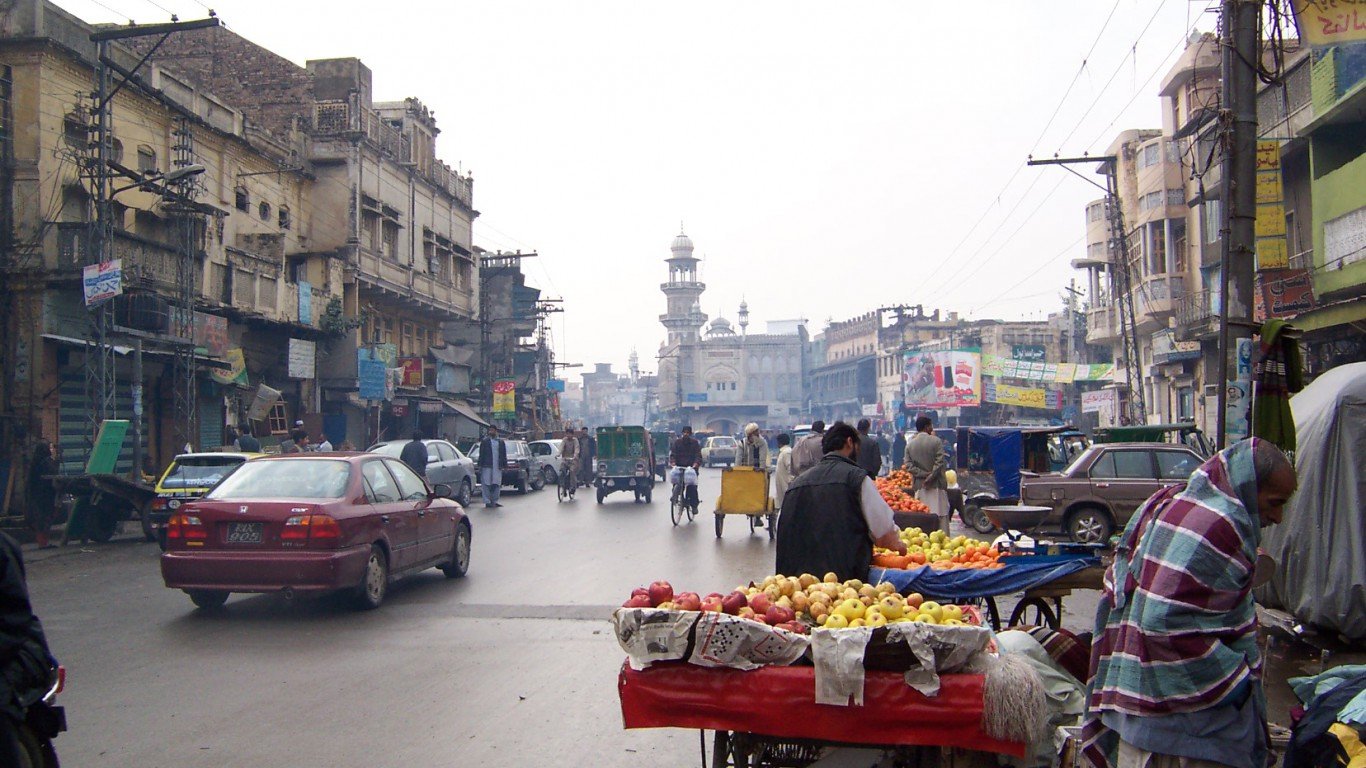
9. Rawalpindi, Pakistan
> Population: 2.6 million
> Average PM2.5 pollution per cubic meter: 107 micrograms
> Average PM10 pollution per cubic meter: 448 micrograms
With an average annual concentration of 107 micrograms of PM2.5 per cubic meter annually, Rawalpindi has the second most polluted air of any city in Pakistan and the ninth most polluted air in the world. As is the case in other heavily polluted countries, like Bangladesh, coal burning brick kilns emitting gases like sulfur oxides and carbon around the city are largely responsible for poor air quality.
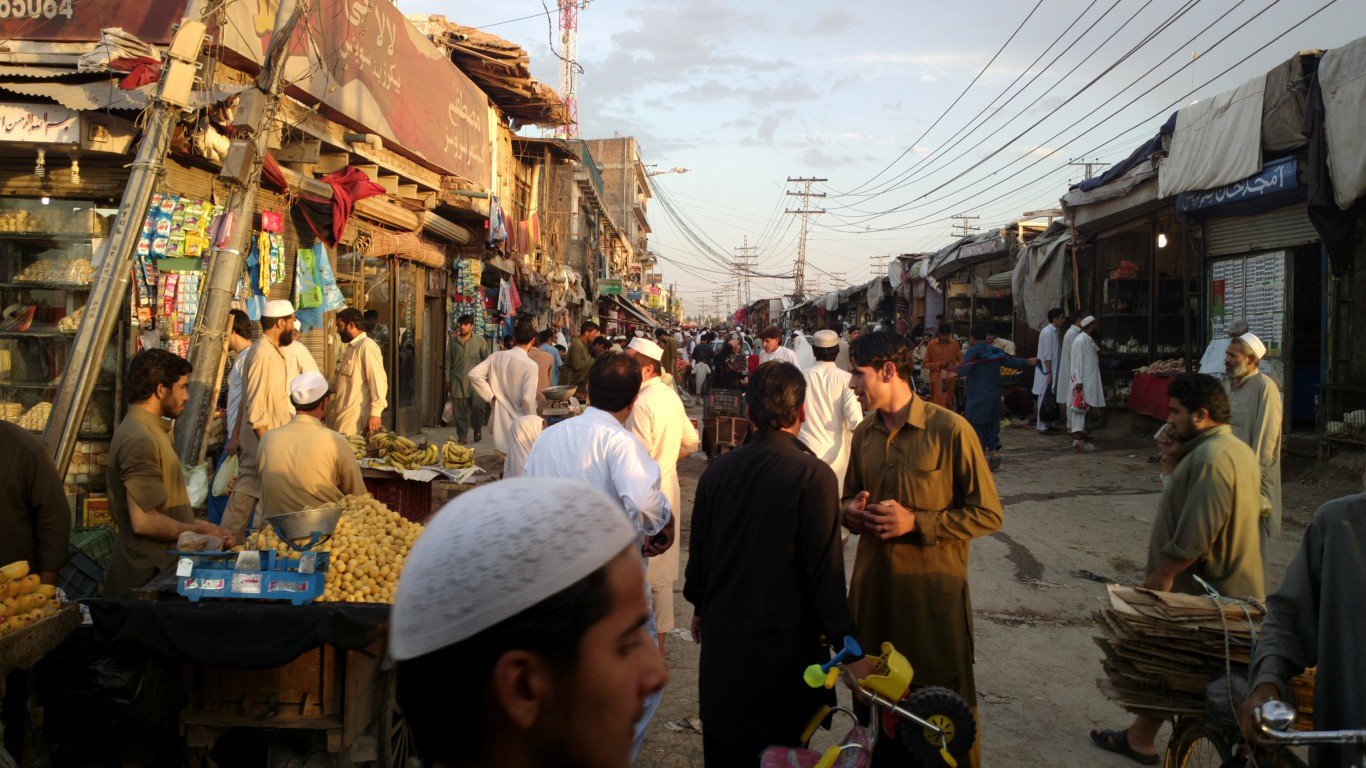
8. Peshawar, Pakistan
> Population: 1.8 million
> Average PM2.5 pollution per cubic meter: 111 micrograms
> Average PM10 pollution per cubic meter: 540 micrograms
Peshawar, a city in Northern Pakistan near the Afghanistan border, is the most polluted city in the country and the eighth most polluted in the world. In addition to having the some of the highest levels of PM2.5 pollution in the world, the city also has one of the highest PM10 pollution levels. PM10 particles are inhalable particles 10 micrometers in diameter or smaller and include dust, mold, and pollen. Such pollution is often generated by crushing and grinding operations or through dust from dirt roads. The slightly larger particulate is typically generated in crushing and grinding operations or traffic on dirt roads.
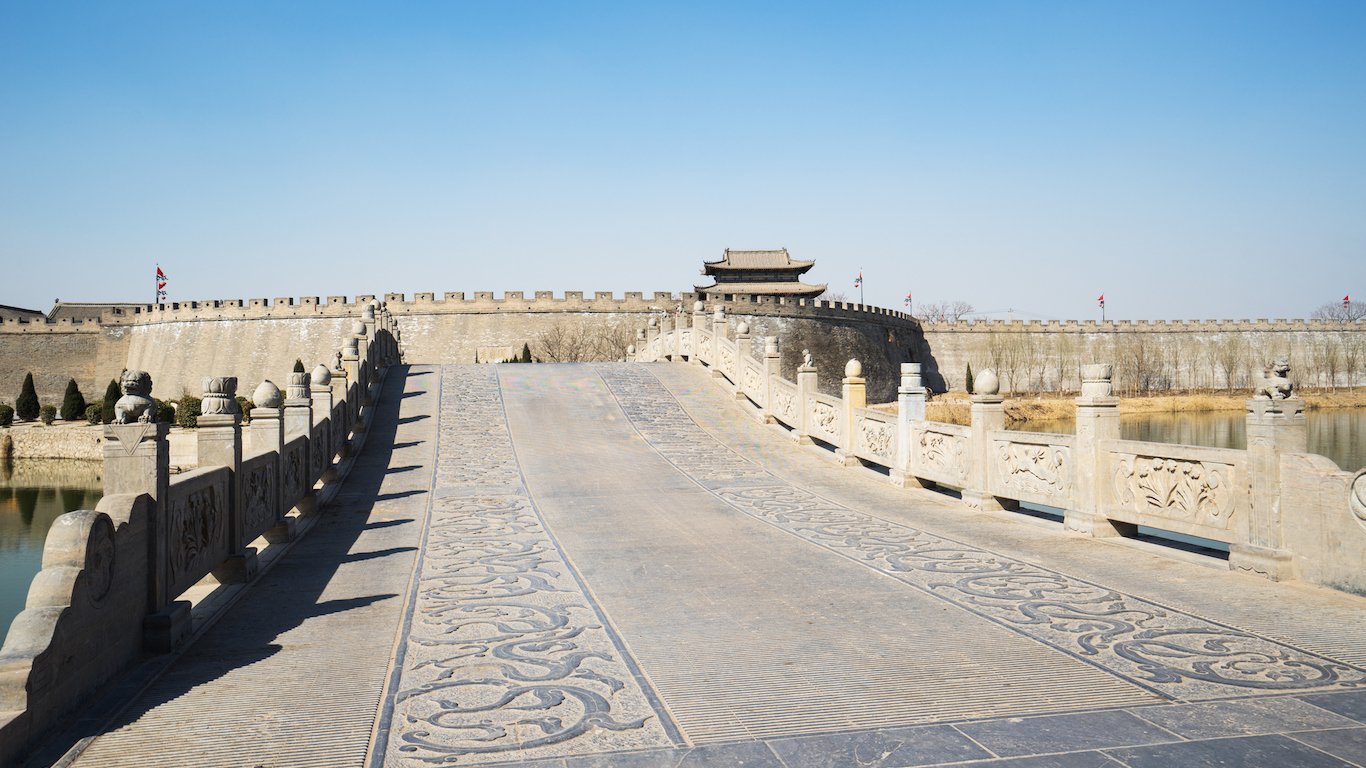
7. Handan, China
> Population: 941,000
> Average PM2.5 pollution per cubic meter: 112 micrograms
> Average PM10 pollution per cubic meter: 169 micrograms
Handan, China is one of the most polluted cities in one of the most polluted countries in the world. The average annual level of concentration of PM2.5 in Handan is 112 micrograms per cubic meter of air.
The region’s heavy industrial sector largely explains the poor air quality in the city. In an effort to reduce pollution and improve air quality, the city ordered steel making operations to cut production by one-quarter from April until November 2018. The city’s cement and glass production facilities are also being forced to cut production but to a lesser extent.
[in-text-ad-2]

6. Shijiazhuang, China
> Population: 3.4 million
> Average PM2.5 pollution per cubic meter: 121 micrograms
> Average PM10 pollution per cubic meter: 305 micrograms
Shijiazhuang is a city located in eastern China. With an average annual concentration of PM2.5 of 121 micrograms per cubic meter of air, Shijiazhuang is more polluted than all but five other cities worldwide. Ceramics production factories in and around the city in China’s Hebei province are major polluters. In response to poor air quality, the provincial government announced plans to reduce airborne PM2.5 particles by 14% by 2020.
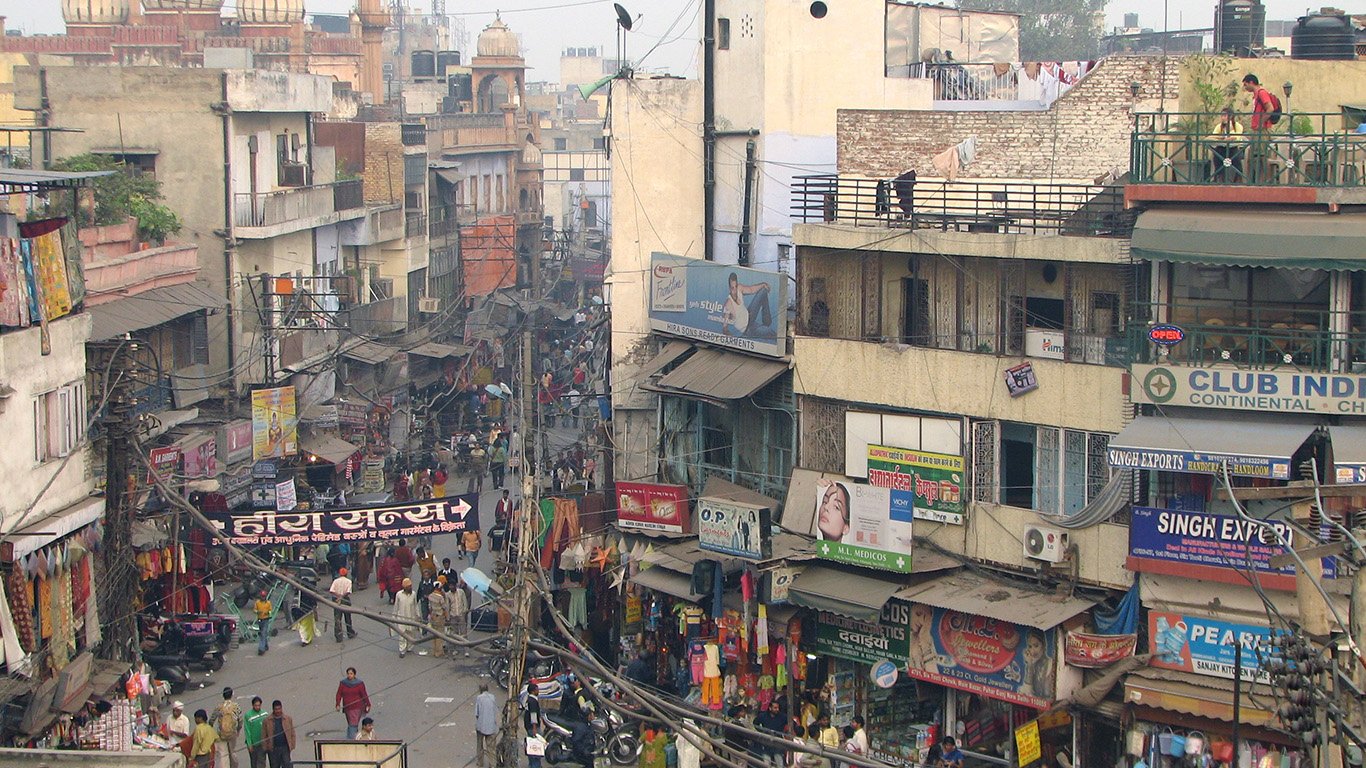
5. Delhi, India
> Population: 26.5 million
> Average PM2.5 pollution per cubic meter: 122 micrograms
> Average PM10 pollution per cubic meter: 229 micrograms
Delhi, India is the second most polluted city in India and the fifth most polluted in the world. The average level of concentration of PM2.5 in Delhi is 122 micrograms per cubic meter of air. PM 2.5 air pollution is nearly seven times more concentrated in Delhi than it is in Visalia-Porterville, California, the most polluted metro area in the United States.
[in-text-ad]
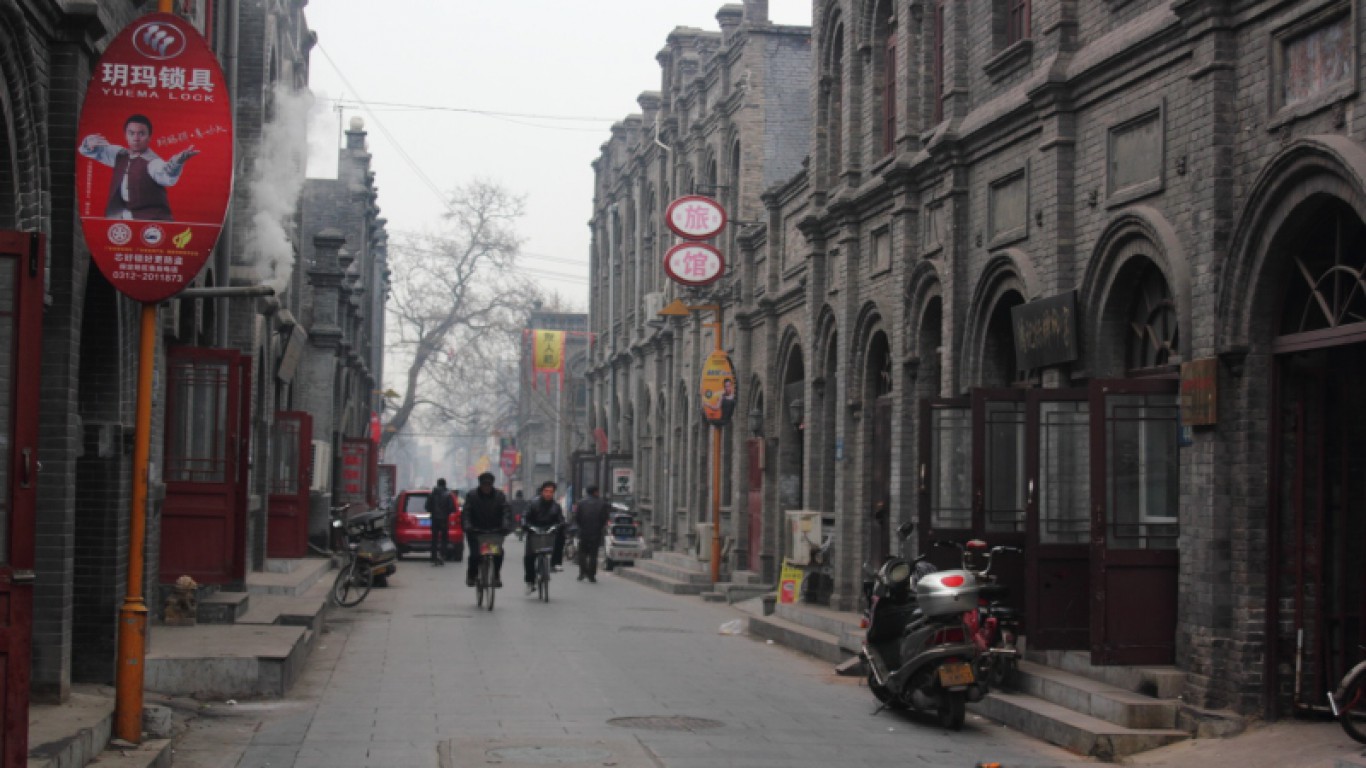
4. Baoding, China
> Population: 1.1 million
> Average PM2.5 pollution per cubic meter: 126 micrograms
> Average PM10 pollution per cubic meter: 190 micrograms
The northeastern Chinese city of Baoding is one of 10 in the country to rank among the most polluted in the world. The highly concentrated air pollution in the city is largely attributable to coal-powered steam boiler systems used in villages around the outskirts of the city. Ironically, the city is one of several in the country to become a green energy hub, using renewable energy to power street lights. It is also home to one of the largest solar panel manufacturers in the world.
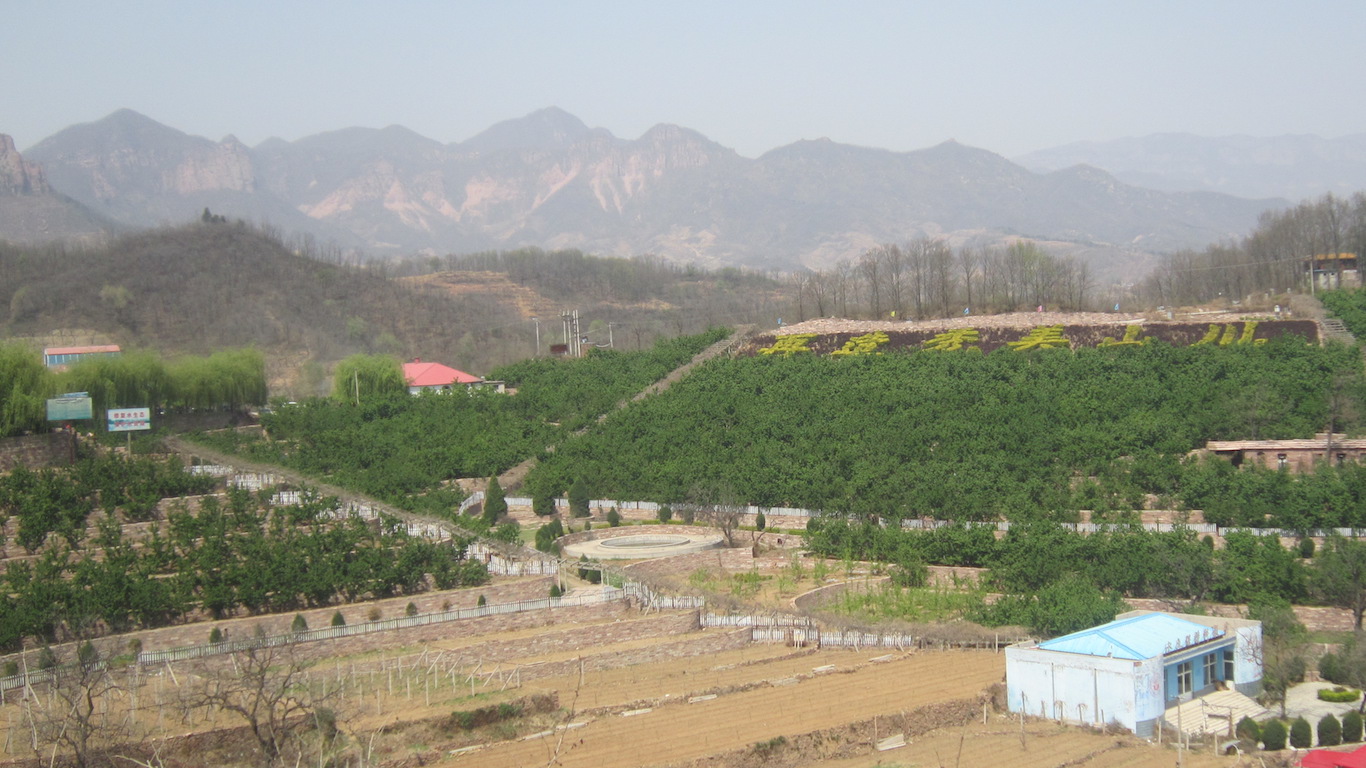
3. Xingtai, China
> Population: 689,000
> Average PM2.5 pollution per cubic meter: 128 micrograms
> Average PM10 pollution per cubic meter: 193 micrograms
Xingtai is one of several cities in China’s Hebei province to rank among the most polluted in the world. Xingtai’s PM2.5 concentration of 128 micrograms per cubic meter is higher than any other city in both the province and the country as a whole. Coal mines and coal powered factories are largely to blame for pollution in the area. The problems are exacerbated by companies disregarding regulations aimed at reducing pollution in order to save money.
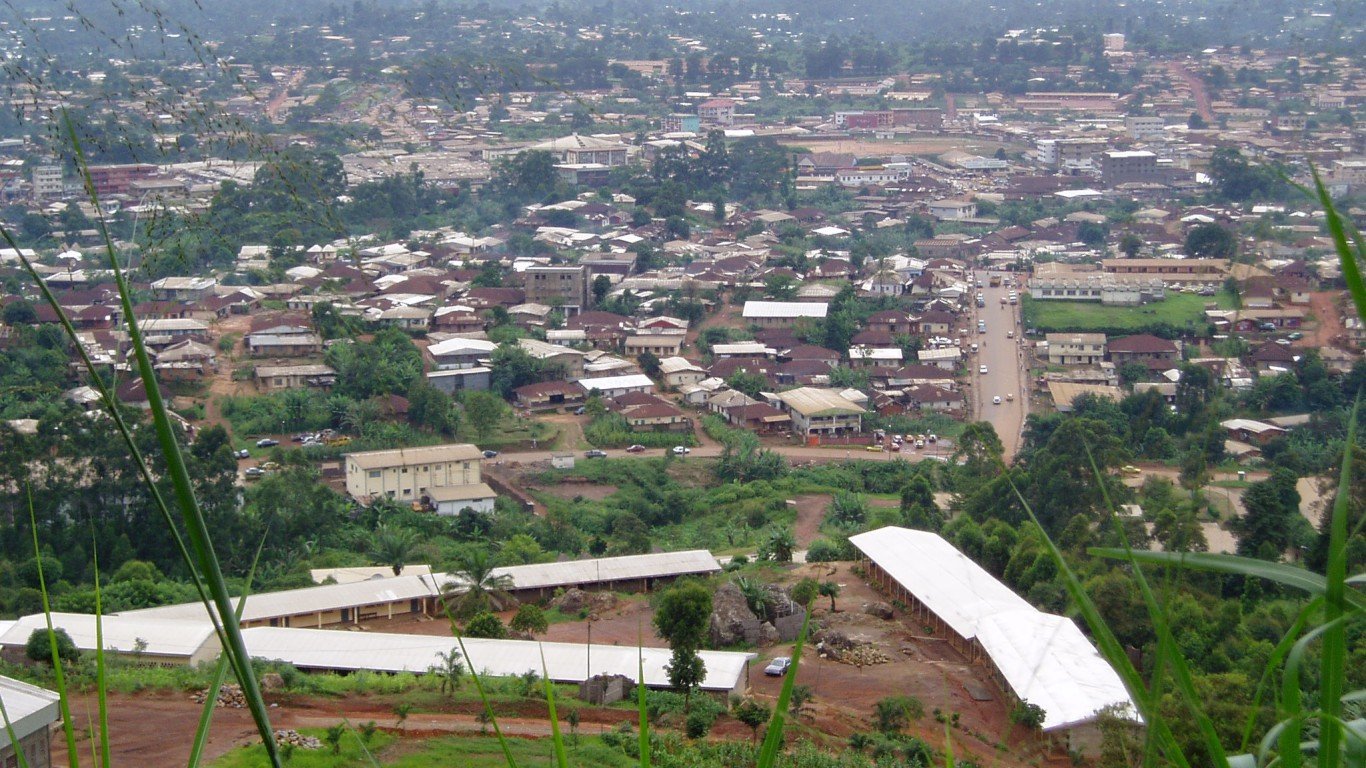
2. Bamenda, Cameroon
> Population: 500,000
> Average PM2.5 pollution per cubic meter: 132 micrograms
> Average PM10 pollution per cubic meter: 141 micrograms
Bamenda, Cameroon has the most polluted air of any African city and the second most polluted air of any city in the world. The average annual concentration of PM2.5 in Bamenda is 132 micrograms per cubic meter of air, which is over seven times the concentration found even in the most polluted U.S. city. Pollution is so bad in Bamenda, that spending just 45 minutes on a congested roadway in the city could be enough to harm one’s health.
[in-text-ad-2]
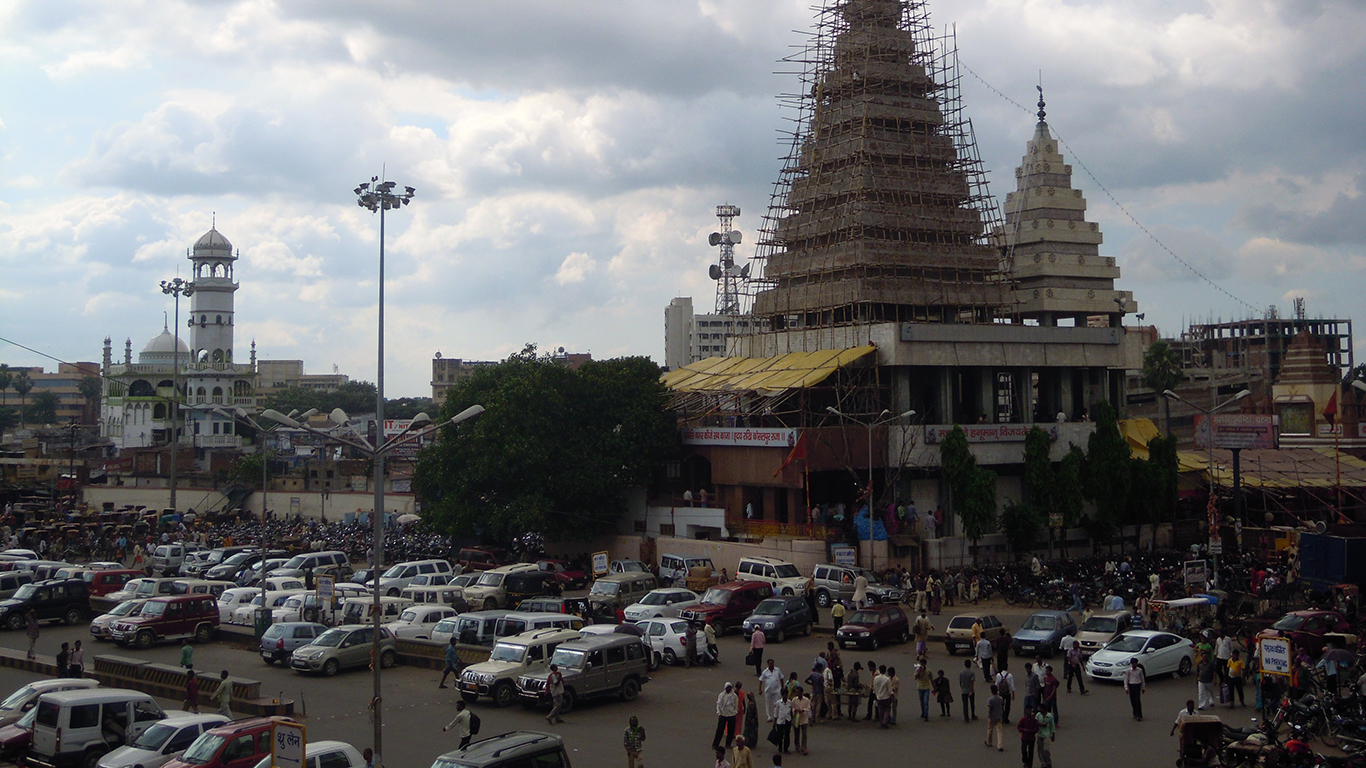
1. Patna, India
> Population: 2.2 million
> Average PM2.5 pollution per cubic meter: 149 micrograms
> Average PM10 pollution per cubic meter: 167 micrograms
One of three cities in India on this list, Panta is also the most polluted city in the world. The average level of concentration of PM2.5 in Patna is 149 micrograms per cubic meter of air, more than eight times the concentration in Visalia-Porterville, California, the most polluted metro area in the United States. Vehicle emissions and smoke from coal burning brick kilns largely explain the high levels of pollution throughout the city.
Detailed Findings
The World Health Organization sets the target concentration of PM2.5 at an average of 10 micrograms per cubic meter per year. Annual average PM2.5 concentrations in the world’s most polluted cities range from 86 micrograms per cubic meter in Zhengzhou, China to 149 micrograms in Patna, India. For comparison, the annual average PM2.5 concentration is 18 micrograms per cubic meter in the Visalia-Porterville metro area. In Los Angeles, the PM2.5 concentration is 11 micrograms per cubic meter.
We also included PM10 pollution, or concentration levels of larger inhalable particles that are 10 micrometer in diameter or smaller. While the finer PM2.5 particles can get deep into lungs and even into the bloodstream, the coarser PM10 particles are of less harmful, although they can irritate a person’s eyes, nose, and throat.
Of the 25 cities on this list, 10 are located in China. Polluted air in cities across China is largely due to the country’s rapid industrialization and growing middle class. Certain manufacturing sectors, steel in particular, can be especially harmful to air quality, and China accounts for about half of all steel production globally.
Some major steel-producing cities in China have been forced to temporarily halt or reduce manufacturing operations to improve air quality. Tangshan, the largest steel producer in the country and the world’s 13th most polluted city, was forced to enact emergency procedures that included reducing steel production in order to address a period of especially heavy air pollution in late 2017.
Similarly, the city of Handan, China ordered steel making operations to cut production by one-quarter from April until November 2018 in an effort to reduce pollution and improve air quality. Handan ranks as the seventh most polluted city in the world and the fourth most polluted in China.
Rapid economic growth and consequently improved standards of living are another factor in the high concentrations of pollution in Chinese cities. China’s annual GDP growth has been at least 6% since 1991, reaching as high as 14.2% in both 1992 and 2007. As the country becomes more affluent, personal automobiles are more affordable and more cars on the road in a country of 1.4 billion means worsening air quality.
For a handful of cities on this list outside of China, including some of those in Africa and Central Asia, pollution is largely attributable to underdevelopment. In Kabul, Afghanistan, for example, only about one in every 50 homes are connected to a sewage system, leaving most household waste to flow and often dry in the streets — much of it ultimately becomes harmful dust. Adding to the problem, many in the Kabul burn animal dung to heat their homes.
In Kaduna, Nigeria, in the absence of access to an electricity grid, many residents rely on generators, which spew out harmful fumes. The city is also without sound waste management infrastructure, resulting in many in the city simply burning their garbage.
Methodology
To identify the most polluted cities in the world, 24/7 Wall St. ranked nearly 3,000 cities worldwide based on the annual average concentration of PM2.5 per square meter of air. Only cities for which PM2.5 concentration was directly measured and not imputed from other measures of air pollution were considered. Though it was not factored into the ranking, we also looked at PM10 concentration. Pollution data came from the World Health Organization. Population figures came from the United Nations’ report The World’s Cities in 2016. For cities not included in U.N. report, population estimates came from a range of sources.
Take the quiz below to get matched with a financial advisor today.
Each advisor has been vetted by SmartAsset and is held to a fiduciary standard to act in your best interests.
Here’s how it works:
1. Answer SmartAsset advisor match quiz
2. Review your pre-screened matches at your leisure. Check out the
advisors’ profiles.
3. Speak with advisors at no cost to you. Have an introductory call on the phone or introduction in person and choose whom to work with in the future
Take the retirement quiz right here.
Thank you for reading! Have some feedback for us?
Contact the 24/7 Wall St. editorial team.